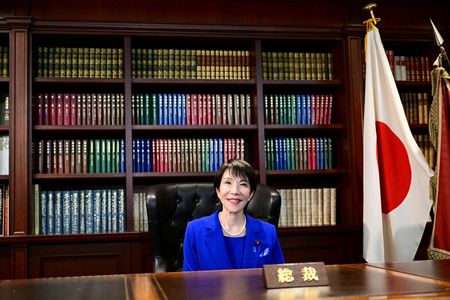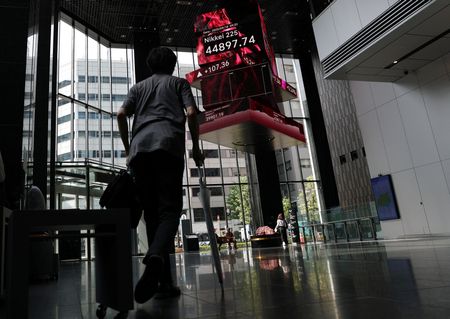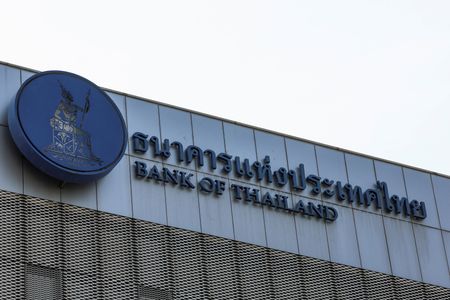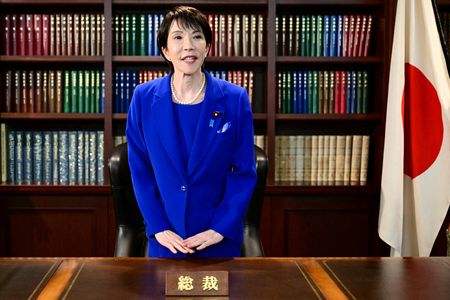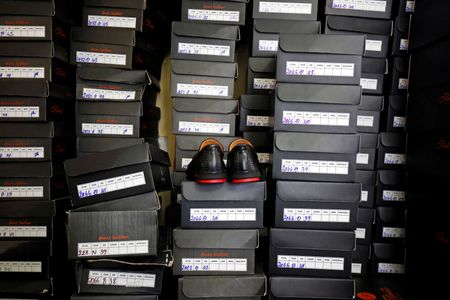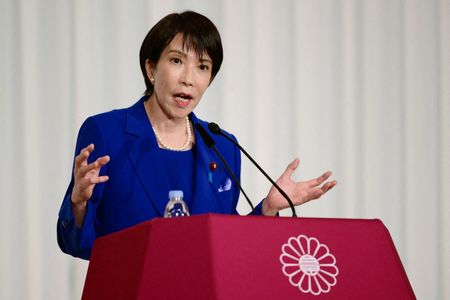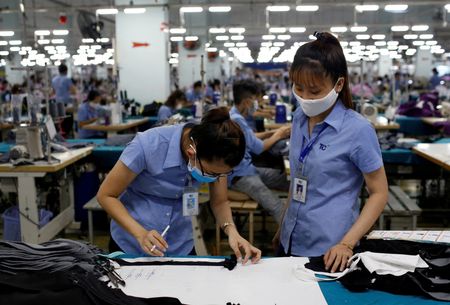By Junko Fujita and Rocky Swift
TOKYO (Reuters) -Japan’s Nikkei share gauge surged past the 47,000 level for the first time on Monday, while the nation’s currency and long-term bonds slumped after a party vote positioned fiscal dove Sanae Takaichi to become the next prime minister.
The Nikkei 225 Index soared 4.6% to 47,852.29, after earlier passing the 46,000 for the first time ever. The broader Topix gauge was up 2.7%.
The 30-year Japanese government bond (JGB) plunged, sending the yield to the brink of a record high. Meanwhile, the yield on the two-year note slid, reflecting expectations of later rate hikes by the Bank of Japan. The yen depreciated more than 1% against the dollar and traded at an all-time low versus the euro.
Takaichi was considered to have the most expansionist fiscal and monetary agenda among five candidates in the Liberal Democratic Party race to replace hawkish Prime Minister Shigeru Ishiba.
“The Nikkei was on course to reach as high as 48,000 by year-end, but because Takaichi was chosen as the LDP leader, it shot up toward that level already,” said Hitoshi Asaoka, the chief strategist at Asset Management One.
“The market welcomes her spending policy, but whether she can achieve that goal is not certain, as the LDP is still a minority party. The Nikkei may retreat once before year-end.”
NEW POLICY DYNAMICS
Takaichi began eyeing cabinet posts on Monday, with media reporting she planned to install former defence minister Minoru Kihara as chief cabinet secretary and bring back ex-foreign minister Toshimitsu Motegi as the country’s top diplomat.
Her pick for finance minister, which will be closely watched by investors, was unclear.
In the lead-up to the LDP race, a “Takaichi trade” emerged – long on stocks and bearish on Japanese government bonds, particularly longer maturities – positioning for a win by the veteran lawmaker who is a devotee of the “Abenomics” stimulus policies of the late Shinzo Abe.
Yields on two-, five-, and 10-year JGBs had all reached levels not seen since the financial crisis in 2008 in recent weeks on bets the BOJ could raise rates as early as this month’s meeting. Long-term JGB yields had fallen, flattening the so-called yield curve.
In a run-off vote on Saturday, Takaichi beat farm minister Shinjiro Koizumi, who was seen as more laissez-faire on monetary policy.
“The market had bet that Koizumi would win, and they were positioned for curve flattening,” said Miki Den, the senior Japan rate strategist at SMBC Nikko Securities. “But because the bet on Koizumi was so strong, it will take time to unwind the flattening positions.”
The yen sank 1.6% to 149.81 yen versus the dollar and weakened to 175.63 against the euro, an all-time low.
The yen swaps market on Monday indicated a 41% likelihood of a rate hike by December, down from 68% on Friday.
The Topix Banks index slumped 2%, the only decliner among 33 industry groups, on expectations for lower lending margins if the central bank delays rate increases.
Mitsubishi Heavy Industries, a major defence contractor, jumped 13% on expectations of more military spending under a Takaichi administration.
Yields on long-term debt face upward pressure on expectations Takaichi will push for more deficit spending, adding to concerns about Japan’s creditworthiness.
The yield on the 40-year JGB, the longest tenor, soared 13 bps to 3.51%. The 30-year yield rose 13 basis points to 3.28%, just shy of the record high 3.285% reached last month in the wake of Ishiba’s resignation.
An auction of 30-year JGBs on Tuesday will be closely watched for signs of concerns about Japan’s finances and debt management under Takaichi.
Despite a modest issuance amount, the debt sale “is expected to be weak because investors —wary of higher term-premia after Ms. Takaichi’s ascent and possible fiscal stimulus— are reluctant to add long-duration risk,” Shoki Omori, the chief desk strategist at Mizuho Securities, wrote in a note.
After her LDP victory, Takaichi told a press conference the government and central bank must work closely to ensure Japan’s economy achieves demand-driven inflation backed by rising wages and corporate profits.
(Reporting by Junko Fujita and Rocky Swift; Additional reporting by John Geddie and Kevin Buckland; Editing by Sam Holmes)

